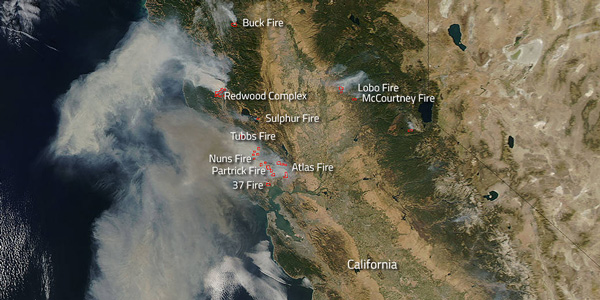By Hudson Sangree
SACRAMENTO, Calif. — An unpopular proposal by Gov. Jerry Brown to limit the liability of utilities for wildfire damage has been tabled for now, a state senator said.
Brown proposed the plan in a July 24 letter to state lawmakers. It would have altered California’s unique system of holding utilities strictly liable for fires sparked by transmission lines and other equipment.
Some critics called it a multibillion-dollar bailout for the state’s three big investor-owned utilities, Pacific Gas and Electric, Southern California Edison and San Diego Gas & Electric.
PG&E, in particular, lobbied heavily this year to repeal longstanding rules that make utilities pay for all wildfire damage, even when the companies are only partly to blame for a fire. The legal doctrine, called “inverse condemnation,” says that because utilities can create easements across private property via eminent domain, they also are liable for damage to private property. Efforts to challenge the doctrine in court have been unsuccessful, even though California is the only state in the nation that employs it to such an extent.
PG&E and other utilities have said their financial stability is threatened by huge wildfire debts. PG&E faces billions of dollars in damages for the highly destructive wine country fires of October 2017, which wiped out the northern portion of the city of Santa Rosa, destroying hundreds of homes.
Investigations by the California Department of Forestry and Fire Protection concluded that some of the most damaging fires in Napa and Sonoma counties last year were caused by trees and branches contacting PG&E power lines.
A PG&E spokeswoman declined comment Monday.
Strict Liability vs. Negligence Test
Brown proposed allowing judges to weigh the benefits of power transmission against the harm done to private property in inverse condemnation actions. His plan would have required a court to decide if a utility had acted reasonably under the circumstances —essentially replacing strict liability with a more lenient negligence test.
A conference committee of state senators and assembly members has been meeting this month to gather information and weigh changes to state law.
The committee’s co-chairman, Sen. Bill Dodd, a Napa Valley Democrat, told several news outlets last weekend that Brown’s proposed liability changes would not be considered during the remainder of the legislative session, which ends Aug. 31. On Monday, Dodd’s spokesman, Paul Payne, told RTO Insider that Senate Bill 901 would move forward without Brown’s liability plan.
“The bottom line is the inverse condemnation [proposal] will not go forward this year. It’s off the table,” Payne said. “The committee will bring the balance of the ideas forward in the final legislative product, which will be SB 901.”
The remainder of the bill deals with wildfire mitigation plans and measures such as reducing fuels and keeping utility lines free of tree limbs and other vegetation.
“There wasn’t enough support for it within the committee,” Payne said of the liability change. “The senator feels some of the prevention measures will do what’s needed to protect the public from future fires, so they’re going to go forward with prevention provisions.”
During a series of hearings in recent weeks, the committee has heard from critics that include cities and counties, farmers, insurers and ratepayer advocates. Many expressed outrage that the utilities might avoid liability even as major fires were raging throughout the state.
Among the groups that testified was The Utility Reform Network. The group’s legal director, Tom Long, urged lawmakers at an Aug. 9 hearing to adopt a disaster relief plan for wildfires such as the Florida Hurricane Catastrophe Fund, which he said could be paid for with small charges on insurance premiums.
TURN spokeswoman Mindy Spatt said Monday the group remains concerned with efforts to relieve utilities of wildfire responsibility. Other bills working their way through the Legislature are far more beneficial to utilities than to ratepayers, she said.
Dodd’s Senate Bill 1088, for instance, would require utilities to submit fire safety plans every two years to the California Public Utilities Commission, which would be required to ensure that cost impacts are just and reasonable, verify compliance with applicable laws and “authorize rate recovery of the reasonable revenue requirements” to implement the plans.
Spatt called it a gift to utilities responsible for starting fires.
“In our view, consumers are still at risk,” she said. “PG&E wants a blank check. They’re lobbying really hard to get that changed.”
The conference committee on SB 901 plans to hold further hearings on Tuesday and Thursday in the State Capitol in Sacramento.
Additional information, including hearing times and agendas, can be found at https://seuc.senate.ca.gov/content/2018-conference-committee-wildfires-sb-901.




